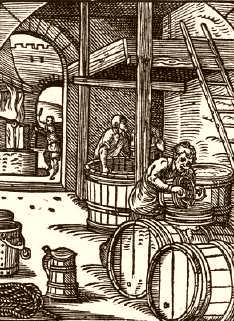Brewing beer
Like many other industries in this period, brewing was moving from the household to the city, where it became a profession-- reducing at the same time the economic importance of the housewife.
Of brewing ordinary beer
Now for the brewing of ordinary beer, your malt being well ground and put in your mash vat, and your liquor in your lead [cauldron] ready to boil, you shall then by little and little with scoops or pails put the boiling liquor to the malt, and then stir it even to the bottom exceedingly well together. . . and so let it stand an hour and more in the mash vat. . .
This done. . . let the first liquor run gently from the malt, either in a clean trough or other vessels prepared for the purpose, and then stopping the mash vat again, put the second liquor to the malt and stir it well together; then your lead being emptied put your first liquor or wort therein, and then to every quarter of malt put a pound and a half of the best hops you can get, and boil them an hour together. . . then let your wort drop or run gently into the dish with the barm [yeast] which stands in the gyle vat; and. . . tun it up into the hogsheads being clean washed and scalded. . . and only for a day or two after keep a vent-hole in it, and after close it up as close as may be.
(Gervase Markham, The EnglishHousewife [1615], the comment from Charles Estienne and Jean Liebault, Maison Rustique, translated Richard Surflet, ed. Gervase Markham, p. 588).
Small beer?
"Small" beer was beer made by infusing hops and malt that had already had one lot of beer made from it; it was thus lower in alcohol, and did not keep so long. By contrast, March beer, made in March when temperature was ideal for brewing, was unusually strong. Gervase Markham comments:
[The English] have March beer, household beer, and small beer: the first is for strangers [visitors], the second for the Master, Mistress and better sort of the family, and the last is for ploughmen or hind [lower] servants.
Compare Iago's ironical suggestion that the ideal woman is fit only "To suckle fools and chronicle small beer" -- to be a poor housewife who must keep track even of the most trivial expenses (Othello, 2.1.158).
